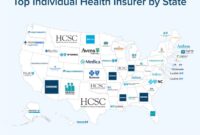Cheap health insurance sets the stage for this enthralling narrative, offering readers a glimpse into a story that is rich in detail with ahrefs author style and brimming with originality from the outset.
Exploring the realm of affordable health insurance opens up a world of possibilities for individuals looking to secure quality coverage without breaking the bank.
Overview of Cheap Health Insurance

Cheap health insurance refers to affordable medical coverage that helps individuals access healthcare services at a lower cost. It is essential for individuals and families to have health insurance to protect themselves from high medical expenses and ensure timely medical care.
Health insurance for young adults is crucial as they transition into adulthood and may no longer be covered under their parents’ plan. It provides financial protection against unexpected medical expenses and ensures access to quality healthcare. Understanding the options available, such as health insurance for young adults , can help them make informed decisions about their coverage.
Types of Cheap Health Insurance Plans
- Health Maintenance Organization (HMO): HMO plans require members to choose a primary care physician and seek referrals for specialist care. These plans typically have lower premiums and out-of-pocket costs.
- Preferred Provider Organization (PPO): PPO plans offer more flexibility in choosing healthcare providers and do not require referrals for specialists. While premiums may be higher than HMOs, PPOs provide a broader network of healthcare providers.
- High-Deductible Health Plan (HDHP): HDHPs have lower premiums but higher deductibles. They are often paired with Health Savings Accounts (HSAs) to help individuals save for medical expenses.
Benefits of Affordable Health Insurance Coverage
- Access to Preventive Care: Cheap health insurance plans often cover preventive services like vaccinations and screenings, helping individuals stay healthy and detect health issues early.
- Financial Protection: Affordable health insurance protects individuals from high medical costs in case of unexpected illnesses or injuries, preventing financial strain.
- Prompt Medical Care: With health insurance, individuals can seek timely medical care without worrying about the cost, ensuring they receive necessary treatments when needed.
Factors Affecting the Cost of Health Insurance

When it comes to determining the cost of health insurance, several key factors play a significant role in shaping the premiums that individuals or families have to pay. Understanding these factors can help individuals make informed decisions when selecting a health insurance plan.
Age
Age is a crucial factor that influences health insurance premiums. Typically, younger individuals are charged lower premiums compared to older individuals. This is because younger individuals are generally healthier and are less likely to require frequent medical services. As individuals age, the risk of developing health issues increases, leading to higher premiums to offset the potential healthcare costs.
Location
The geographic location of an individual also impacts the cost of health insurance. Healthcare costs can vary significantly from one region to another due to factors such as the cost of living, availability of healthcare providers, and state regulations. Urban areas with higher healthcare costs may result in higher insurance premiums compared to rural areas.
Coverage Limits and Deductibles
The coverage limits and deductibles chosen by an individual can also affect the cost of health insurance. Plans with higher coverage limits and lower deductibles typically have higher premiums since they offer more extensive coverage and require less out-of-pocket expenses. On the other hand, plans with lower coverage limits and higher deductibles have lower premiums but may result in higher costs when individuals need medical services.
Pricing Strategies of Health Insurance Providers
Health insurance providers employ various pricing strategies to determine premiums. Some insurers may use community rating, where premiums are the same for all individuals regardless of age or health status. Others may use experience rating, where premiums are based on an individual’s health history and risk factors. Additionally, some insurers offer discounts for healthy behaviors or participation in wellness programs, which can lower premiums for policyholders.
Overall, understanding how age, location, coverage limits, deductibles, and pricing strategies impact health insurance premiums can help individuals make informed decisions when choosing a health insurance plan that best fits their needs and budget.
Strategies for Finding Affordable Health Insurance: Cheap Health Insurance
Finding affordable health insurance can be a daunting task, but with the right strategies, you can secure a plan that fits your budget while providing adequate coverage. Here are some tips to help you find cheap health insurance plans and make the most of your healthcare budget.
Comparing Quotes from Different Insurance Companies
When looking for affordable health insurance, it’s crucial to compare quotes from different insurance companies. Prices can vary significantly between providers, so taking the time to shop around and compare options can help you find the best deal. Look for plans that offer the coverage you need at a price you can afford.
Utilizing Government Subsidies and Programs
Government subsidies and programs can help make health insurance more affordable for those who qualify. Depending on your income and other factors, you may be eligible for subsidies that can lower your monthly premiums or out-of-pocket costs. Explore options like Medicaid, CHIP, or subsidies through the Affordable Care Act to see if you qualify for assistance in paying for health insurance.
Risks and Considerations of Cheap Health Insurance
When considering cheap health insurance options, it is crucial to understand the potential risks involved. While affordable premiums may seem enticing, there are important considerations to keep in mind to ensure you are adequately protected in case of illness or injury.
Potential Risks Associated with Low-Cost Health Insurance, Cheap health insurance
- Coverage Limitations: Cheap health insurance plans often come with limited coverage options, which may not fully meet your healthcare needs. This can result in out-of-pocket expenses for services not covered by the plan.
- High Deductibles and Co-payments: Some inexpensive health insurance plans have high deductibles and co-payments, meaning you will have to pay a significant amount before the insurance kicks in. This can lead to financial strain when seeking medical treatment.
- Restricted Provider Networks: Low-cost health insurance plans may restrict you to a limited network of healthcare providers, making it challenging to access the healthcare professionals you prefer.
Understanding Coverage Limitations of Inexpensive Plans
- Read the Fine Print: It is essential to carefully review the coverage limitations of cheap health insurance plans to understand what services are included and excluded.
- Know Your Out-of-Pocket Costs: Be aware of your financial responsibilities, including deductibles, co-payments, and coinsurance, to avoid unexpected expenses.
- Consider Your Healthcare Needs: Evaluate your healthcare needs and ensure that the inexpensive plan provides adequate coverage for services you require.
Balancing Affordability with Adequate Coverage
- Compare Plans: Take the time to compare different health insurance plans to find a balance between affordability and coverage that meets your needs.
- Seek Professional Advice: Consult with insurance experts or healthcare professionals to help you navigate the complexities of health insurance and find the right plan for you.
- Avoid Underinsuring: While opting for cheap health insurance is tempting, avoid underinsuring yourself to prevent financial hardships in the event of a medical emergency.
In conclusion, navigating the realm of cheap health insurance requires a delicate balance of affordability and comprehensive coverage to safeguard against potential risks. By following the strategies Artikeld and understanding the key factors influencing costs, individuals can make informed decisions to protect their health and financial well-being.
Low-cost individual health insurance is a viable option for those who do not have access to employer-sponsored plans or government programs. It offers basic coverage at affordable rates, making it accessible to a wide range of individuals. Exploring options like low-cost individual health insurance can help individuals find a plan that fits their budget and healthcare needs.
Private health insurance plans cater to individuals who prefer personalized coverage and a wider network of providers. These plans offer flexibility in choosing doctors, hospitals, and services, ensuring tailored healthcare solutions. Exploring the benefits of private health insurance plans can help individuals find comprehensive coverage that meets their specific needs and preferences.




